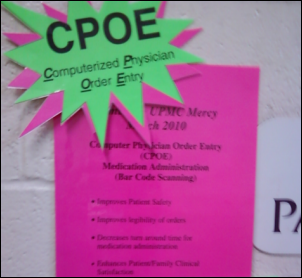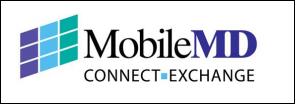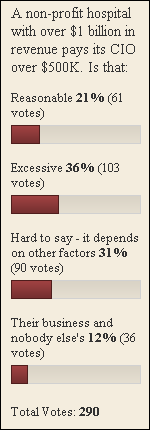I'd never heard of Healwell before and took a look over their offerings. Has anyone used the products? Beyond the…
Monday Morning Update 11/16/09
From HITMarqueen: “Re: OR cameras. I’m curious if you have any thoughts on the recent ruling by Rhode Island’s Dept. of Health that requires video cameras be installed in all Rhode Island Hospital operating rooms to monitor patient safety during surgical procedures? This is in addition to a $150K fine for the most recent wrong-site surgery at the hospital.” The state had to do something. Rhode Island Hospital has done five wrong-site surgeries since 2007, most of them really stupid (three wrong-side brain surgeries and the most recent gaffe, operating on the same finger twice instead instead of the two intended fingers — how can you make excuses for that?) Surgeons weren’t marking their sites and time-outs weren’t being done, which sounds like a great reason to revoke their privileges. The state ordered the hospital to assign someone to watch the camera for at least a year, observing every surgery to make sure the marking and time-outing are done (sort of like a football replay official, I guess). They’re darned lucky to be allowed to keep their OR open. Want to bet it’s not just the OR that has problems?
From H. Boc: “Re: Pano Logic devices. HBOC had one of these years ago. Whenever money was nearby, a little hand would come out of the box and snatch it. Then a voice in the box would tell you that the software was going through an upgrade and would be delayed for install.” That must have been a Pathways box. Maybe it handed back a side letter.
From Connie Ripley: “Re: content management. I’m curious to get an idea of how many healthcare or HIT companies are taking Content Management seriously? I see this as an area in dire need of improvement and I can tell you straight from the trenches that it’s not for the faint of heart.”
From Mercy, Mercy Me: “Re: parking garage advertisement. This is what attracts doctors to use CPOE.” UPMC Mercy has the right idea since you only have a few areas in which you can get the attention of doctors: the parking lot, the doctor dining room or lounge, and the chart completion area. Once they get them on CPOE, they can add nag screens for subtle messages of propaganda. Or, send them off to re-education camp
From Peter Gunn: “Re: HIMSS. Dang! I was dying to go to HIMSS last year in Chicago, but I live in Atlanta, and now that HIMSS is here in Atlanta, it sounds like it’s not worth going!” I’ll go out on a limb and say that it’s been years since it was worth going if you consider just the official offerings — the self-congratulatory opening session, lame keynotes, mediocre educational programs carefully limited to ensure vendor access to providers in between, having HIMSS-sponsored and ad-filled publications thrust into your face at every turn, and being herded to the exhibit hall like cattle in a slaughterhouse. The best thing about HIMSS is all the non-HIMSS people and events. They haven’t figured out a way to screw that up yet (although the uber-commercial tone threatens to keep providers home, which would then make the conference pointless). You could get most of the value of the conference by not registering at all, just hanging around the public areas of the convention center and attending non-HIMSS events. That would save you only $640 of the total cost, though. There are many things I don’t like about the conference, but I still go.
From Michelle Flaherty: “Re: EHR vendors. QHR will acquire Clinicare, a KLAS winner (Chartcare). Both companies are in Canada. Also, Noteworthy Medical Systems, acquired early this year by CompuGROUP Holding AG of Germany, is sunsetting its non-ASP product.”
From Just Checkin’: “Re: HIMSS shindig. So admittedly we’re not even to Thanksgiving, but given the need to schedule time off way in advance, I gotta get organized. Will the annual shindig take place at HIMSS? If so, is there a date?” I theorize that the beginning of winter gets people thinking about HIMSS, even though it’s a while away (I’ve booked an ultra-cheap hotel already myself and need to pay my $640 registration fee before it jumps to $740 on December 15). I’m still working on details of the reception with the sponsoring company. It is horrifically expensive to put these on — you could have a swanky evening in the best restaurant in Atlanta and still spend a lot less than it costs per person to offer just a couple of drink and snacks in a private reception. When we first did it in Orlando, I was naive enough to think that we could just buy out some big restaurant and spend $75 per head for an open bar and dinner, but that brings other challenges: which places are available during HIMSS, how many can they hold, how do people get to and from, is it suitable for mingling and having a speaker or two, and how many slots does the sponsoring company want for their own use. It’s also a tough sell to vendors since many of the attendees will be HIStalk readers who work for other vendors. I’m hoping for the usual Monday night, but it’s still up in the air.
Speaking of which, it will be HISsies voting time soon. To prevent the usual ballot box stuffing, only those on the e-mail blast list will be able to vote this year. If you want in, put your e-mail address in the Subscribe to Updates box.
HIE service provider MobileMD gets $4.75 million in a VC funding round led by Health Enterprise Partners.
Athenahealth is awarded a patent for its athenaNet billing rules engine. Shares rose almost 5% Friday after the announcement, closing near their 52-week high.
An MIT research assistant creates SixthSense, a combined camera and projector worn around the neck that turns any surface into a screen and input device for smartphones, which he says will allow low literacy citizens of India to use software applications as their gestures are translated into commands. The TEDIndia demo video is amazing. If you’ve seen Minority Report, it will look familiar. Manufacturing costs are estimated at $350. The audience went bonkers, especially when he used his hand as a screen in the picture above.
Here’s my response to the announcement that HIMSS won’t be going back to Chicago because it’s too expensive: duh. Everybody who has every been involved in conference planning is well aware that strong unions, expensive hotels, and rife corruption have made Chicago a terrible place to hold a conference (not to mention that it snows in April, as we now know, although that was a plus to HIMSS because it kept people in the exhibit hall instead of doing something fun). If HIMSS was shocked (no pun intended) by the electrical costs of the most recent conference, then it didn’t do its due diligence and the vendors who had to pay those ridiculous costs ought to be mad. I’ll predict now that exhibitors will be griping after the Lost Wages conference that everybody bailed on the exhibits to go to the casinos and shows.
September’s Harvard Meeting on an HIT Platform (the “HIT should work like an iPhone” meeting) was invitation-only, but they’ve posted videos and an executive summary (warning: PDF). It includes Aneesh Chopra and Todd Park talking about turning NHIN into the “Health Internet”, hoping to make a lot of patient data available around which new applications could be built.
A non-profit hospital paying its CIO over $500K is not clearly excessive, say 64% of survey respondents. New poll to your right: is it OK that HIMSS offers cash payment to conference attendees who attend vendor demos?
The Madison paper covers the construction of Epic’s second campus, with the four buildings now halfway finished and one occupied. It says the company will add another 200 employees this year for a total of 3,400, including a Netherlands office with 35.
Speaking of Epic, this comment from a David Blumenthal e-mail (that I get, for some reason) seems to be a shot at MyChart and Epic’s other data sharing programs that work only for Epic-using hospitals: “… we cannot support arrangements that restrict the secure, private exchange of information required for patient care across provider or network boundaries.” Glen Tullman was also talking apparently talking about Epic (since he’s made similar comments elsewhere that named them specifically) in my interview with him this week:
“We need an interoperable system no different than the ATM networks that we use, no different than cellular networks. We have many different competitors, but they’re all using — they’re all connected to a network exchanging information; and of course, no different than the Internet. That’s the model that everyone ought to be forced to play in. We have some holdouts who are really not supporting this idea of full interoperability. So if I could change one thing, I would say we’ve got to much more aggressively push on interoperability.”
I had a question I would have asked had we not been running short on time: “Wouldn’t Allscripts do the same thing if it had the same chance as Epic?” Not for unsavory reasons, but because having big market share in an area provides some fast, cheap interoperability opportunities that are great for patients in those areas, even if they don’t tie into whatever regional or national networks that are being considered.
Exempla Lutheran Medical Center (CO) goes live with its Epic EMR. The three-hospital cost: $85 million, plus another $4 million for its physician practice.
Tampa-based Tech Data forms a healthcare business. Stimulus dollars may not be doing much good for unemployment, but they’re bringing a lot of companies into healthcare that weren’t interested until the taxpayer money chummed the waters. All I’ll say to the prospects they’ll try to convince of their newfound interest: lots of companies got out of healthcare just as fast as they got into it when the expected profits didn’t materialize. It’s not like we’re a new industry.
The ACG Boston 2009 Fall Conference & Private Company Showcase is this week in Boston. Speakers: John Halamka (of course), Todd Cozzens of Picis, and Carl Byers of athenahealth. Cost to attend the 3.5 hour conference – $330.
A doctor in China loses his job and his license after investigators checked computer records and verified that he was playing online computer games at work while a five-month-old baby he was supposed to be monitoring died.
Apple files a patent for its long-rumored tablet PC.
University of Maryland Medical System will float a $250 million bond sale, with a portion of the proceeds to be spent on clinical systems.
Merge Healthcare will sell $27 million worth of new shares to pay off debt. Shares are worth eight times what they were a year ago, but still barely more than 10% of what they sold for three years ago. It also has expanded its offerings in China.









Re Interoperability- paraphrasing Inigo Montoya’s line from the movie Princess Bride ‘I don’t think this thing will do what you think it will’. I don’t see how interoperability will do much to reduce costs
or save lives. Example often cited is the unconcious patient on vacation in Florida with a PCN allergy. How does the mystery patient give consent/password access for the “secure, private exchange of information” mentioned above by Epic critic David Blumenthal. I just don’t see where the magic is coming from. Perhaps it’s time for a survey to see if anyone in your audience thinks interoperability will deliver.
Re;All the HIMSS Talk…I think all the professional orgaizations are going the same way…their own profit. ACHE like HIMSS requires CE to maintain certification, but they are the only ones that provide it and very expensive. ASHP meetings are now mostly vendor focused programs. I think most of these organizations exist for sepf preservation
Re: Content Management question from Connie Ripley – I believe we need a star-spangled million-dollar Government contract for a consulting firm to define ‘content management’ before we can answer the question, or maybe HIMSS can start a SIG, load it with 90% vendor participation and demand that we all accept the definition in the terms of our membership agreement.
Seriously, the term, “Content Management,” is as over-used in some circles as RFID, Web 2.0, ‘its web-based’, eDiscovery, social networks, interoperability, integration, business intelligence, and “vendor partner,” just to name a few. The definition of the terms that scares me is the fact that information flies in-and-out of an organization and on-and-off of screens, and with the new regs, some security “experts” try to get you to monitor and regulate every bit and byte while we live on shoestring budgets. The security processing power and storage of all that log data would eclipse everything we store now.
I am tired of seeing people try to compare ATM networks with exchanging clinical information. ATMs exchange information consisting of a single data type (currency) and two operations (addition and subtraction). Compare that to exchanging clinical information where some information is objective and quantitative (e.g. lab results), yet it may be represented in completely different ways in different organizations (use of local codes, and/or representing different ways of gathering and organizing the same information). How well would ATMs work if every town had its own currency? Even that doesn’t take into account the context within which clinical information needs to be evaluated.
Exchanging discrete clinical data is a much harder problem than financial institution interoperability even without the existing political and business barriers among healthcare providers. Those who keep bringing up the flawed ATM analogy clearly don’t understand the problem, and that seems to include Glen Tullman.
If David Blumenthal is indeed referring to Epic in his e-mail he seems to be misinformed. AFAIK, Epic’s data sharing programs are not limited to Epic-to-Epic exchange. An Epic-to-Epic exchange can obviously provide richer information given that the two systems would share a common data model.
Maybe if ONCHIT would build the mechanism for allowing healthcare organizations to directly join the NHIN, and open the closed process of creating the NHIN specifications, he would see “secure, private exchange of information required for patient care across provider or network boundaries” in real life, and not just in concept…
The existence of the open-source CONNECT project (http://www.connectopensource.org/display/Gateway/CONNECT+Community+Portal) is a good step in that direction, but there is much more work to do…
Glen Tullman is intentionally misdirecting people. AllScripts exchange approach is virtually a carbon copy of Epic’s. AllScripts to Allscripts is free and a benefit of being part of the AllScripts family, just as Epic’s Care Everywhere is. They both offer interfaces that comply with national standards for interoperability. When he tries to call out Epic on this – he is misdirecting his listener and he is doing it intentionally.
Shut down the OR at RI Hospital. It’s the only way to make an example out of them. These “mistakes” are unacceptable. How many people are in the room and are unwilling to speak up and say “Hey, you’re operating on the wrong site/side!” Someone needs to be held accountable. Having cameras there is going to do nothing except help the lawsuits that will follow. By then, it’s too late for the patients. I’m sure the patients would rather not have gone thru with the incompentent surgeons.
Any update on what has / will be done regarding the two cases at Shriners Hospital for Childrens at Tampa (1) Chief of Staff got a DUI and the Anesthesiologist also got a DUI. Are these people goign to be allowed to continue to practice? Any repremands? Doesn’t seem like the Administrator is taking any action against either of them.
Re: HIMSS in Lost Wages – For three years I managed trade shows for a vendor that regularly exhibited at HIMSS. In that time, HIMSS leadership swore off ever returning to Vegas. Exhibitors were not too happy that once the educational sessions for the morning were over all the attendees were gambling, golfing and buying tickets for Siegfried and Roy. The current exodus of major players from the exhibit floor will only get worse over the next few years. HIMSS was always the most expensive show per square foot at which my formerly employer participated as an exhibitor. I have always felt vendors were conspicuous in their absence at HIMSS and still believe that, but HIMSS needs to reconsider it’s pricing structure for exhibitors or risk further withdrawals.
Two things: first, comparing ATM networks to patient health information exchanges is like comparing “apples to oranges”. The validity of the comparison/analogy ends at electronic connectivity. The data exchanged is radically different, and the workflow supported by the exchanged data in these “analogs” is also radically different. Both have their unique complexities; the argument that draws an analogy between helthcare exchanges and ATM networks simply has no merit. Trying desperately to distill everything down to a single normalized form using overly simplified analogies is lazy thinking, in my opinion. And, in response to this posting please don’t reference our scientific community’s attempt at determining a single, unified theory of the physics of the universe. Their attempts at doing so are ripe with complexity and “rubber meets the road” experience and effort – not lazy analogies.
Second, patient exchanges have the opportunity to reduce costs, improve patient outcomes, and enhance patient – physician relationships. Dan’s example, above, of an unconscious patient unable to provide consent to share information is a question of the value of patient privacy vs. patient care. It is absolutely not a question of the inherent value of being able to share patient health information such that care providers can make good choices. Please pick the right argument. In this case, the argument is privacy vs. patient care – not the value of exchanges.
RE: HIMSS condemnations. I have to stick up for New England HIMSS, a fantastic group with tons of educational and networking opportunities for members. This group is consistently vendor neutral and provides a great service to its constituents. I know of no other professional society for Health Care IT that even comes close.
RE: HIMSS
I served on my local HIMSS board for six+ years and have several observations. One of National HIMSS goals has been to grow the local chapters and have them put on programs, etc. They have been so successful at their goals, that I believe this may also be hurting the National conference.
For example the Midwest Fall Technology Conference in Grand Rapids, MI, put on by a handful of local chapters (IA, MN, WI, IL, IN, MI) drew around 400 recipients, and even had John Halamka video conferenced in as a keynote!
These local chapters are soliciting sponsors, to the point where National had to force the local chapters to not use the same named spsonsor levels (platinum, gold, and silver) that they used to prevent confusion among the vendors.
So one has to wonder if a company has a choice to send people closer to home, with education sessions/conferences that duplicate the topics at National, but have a more regional flavor, for a cheaper price tag, what choice they might make. Or for those conference or HIMSS sponsorship dollars, where is the biggest ROI.
I think comparing health information exchanges is much more akin to the credit reporting bureaus, not an ATM network. And who doesn’t love the credit reporting bureaus?!
When your unconscious patient has a heart attack in Florida, how, exactly, are we going to get positive, unique identification of this patient to pull his or her medical report down from these exchanges? And when (not if) we have medical mistaken identity — how, exactly, am I (as a patient) going to tell this health information exchange that this visit wasn’t mine – it was for a different patient, not me. I’m not on these meds. I don’t have this condition. (etc etc).
How long before Congress has to pass a law for “myfreemedicalreport.com” to give patients the right to even see their medical information in an exchange, and fight with the exchange to try & get it corrected.
At least some enterprising company will be able to come up with some complicated formula to take our medical information and generate a score for medical insurance agencies to use to justify charging higher & higher rates (or denying coverage altogether).
What could possibly go wrong?
Echoing the comments of others, enough with the ATM metaphor. It fails miserably until ATMs figure out a way to kill us through negligence.
And to Epic, why wouldn’t they (or any other vendor) worry first about connecting networks of their customers? They control both ends of the interface, and can easily establish trust. The NHIN project raises so many issues about privacy and control of personal information that its going to take years to sort out the legal issues and then deal with a major percentage of patients that opt out anyway. All for the seldom seen use case of the interstate out-of-network accident.
I wish I could see my medical information and decide who to give it to. I’ll worry more about doctors when that is possible. (and I mean all of it, not just the personal Microsoft filtered version)